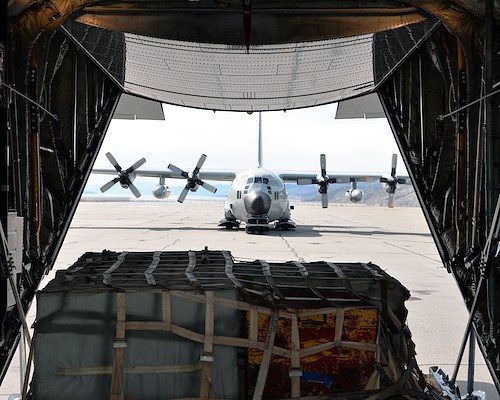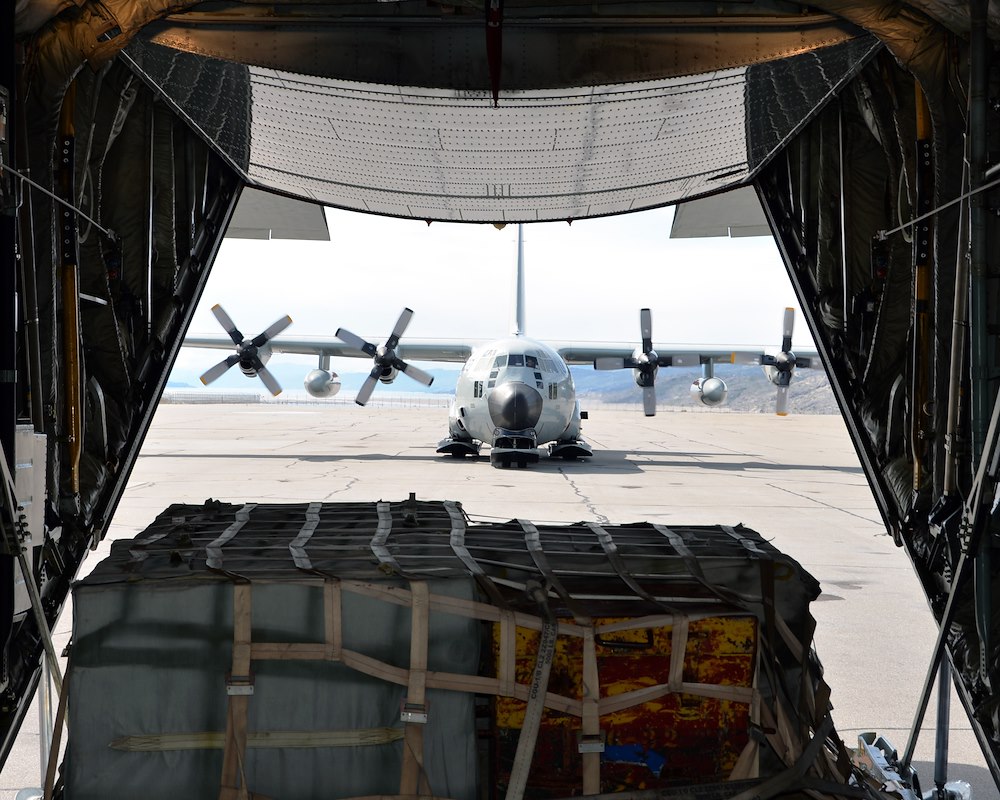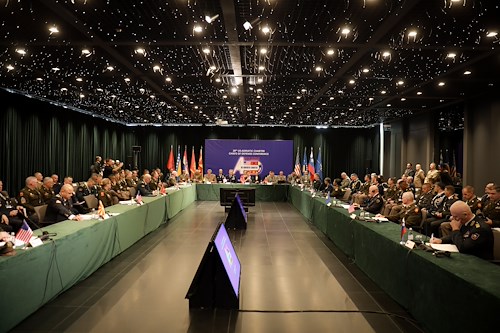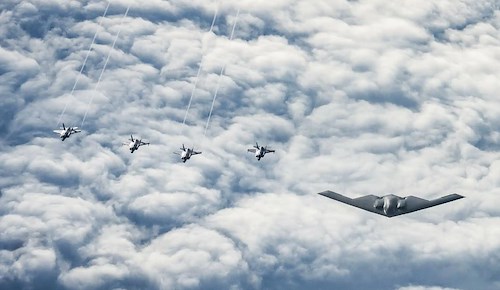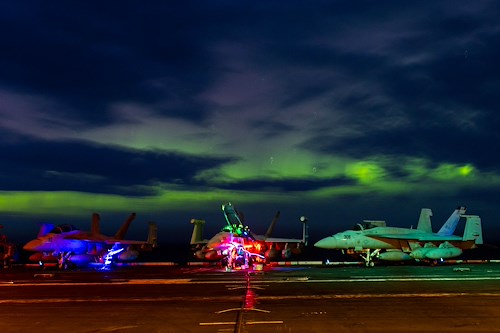Gallery contains 5 images
×
Photo 1 of 5
United States European Command Image
A New York Air National Guard 109th Airlift Wing LC-130 "Skibird" is loaded at Kangerlussuaq, Greenland, on June 28, 2016.Four LC-130s and 80 Airmen from the New York Air National Guard's 109th Airlift Wing in Scotia, New York, recently completed the third rotation of the 2016 Greenland season. Airmen and aircraft for the 109th Airlift Wing stage out of Kangerlussuaq, Greenland, during the summer months transporting fuel, supplies and passengers in and out of various National Science Foundation camps throughout the entire season and also train for the Operation Deep Freeze mission in Antarctica. The unique capabilities of the ski-equipped LC-130 aircraft make it the only one of its kind in the U.S. military, able to land on snow and ice. (U.S. Army National Guard photo by Sgt. Major Corine Lombardo/Released)
Photo by: Sgt. Maj. Corine Lombardo
Photo 2 of 5
United States European Command Image
New York Air National Guard Staff Sgt. Matthew Jones, 109th Airlift Wing LC-130 "Skibird" Loadmaster clears snow from a pallet being uploaded onto a LC-130 "Skibird at Camp Raven, Greenland, on June 28, 2016.An LC-130 "Skibird" from the New York Air National Guard's 109th Airlift Wing in Scotia, New York, lands at Camp Raven, Greenland, near the DYE-2 site, on June 28, 2016. Crews with the 109th AW use Camp Raven as a training site for landing the ski-equipped LC-130s on snow and ice. Four LC-130s and 80 Airmen from the Wing recently completed the third rotation of the 2016 Greenland season.
Photo by: Sgt. Maj. Corine Lombardo
Photo 3 of 5
United States European Command Image
An LC-130 "Skibird" from the New York Air National Guard's 109th Airlift Wing in Scotia, New York, lands at Camp Raven, Greenland, near the DYE-2 site, on June 28, 2016. Crews with the 109th AW use Camp Raven as a training site for landing the ski-equipped LC-130s on snow and ice. Four LC-130s and 80 Airmen from the Wing recently completed the third rotation of the 2016 Greenland season. Airmen and aircraft for the 109th Airlift Wing stage out of Kangerlussuaq, Greenland, during the summer months, transporting fuel, supplies and passengers in and out of various National Science Foundation camps throughout the entire season and also train for the Operation Deep Freeze mission in Antarctica. The unique capabilities of the ski-equipped LC-130 aircraft make it the only one of its kind in the U.S. military, able to land on snow and ice. (U.S. Army National Guard photo by Sgt. Major Corine Lombardo/Released)
Photo by: Sgt. Maj. Corine Lombardo
Photo 4 of 5
United States European Command Image
An LC-130 "Skibird" from the New York Air National Guard's 109th Airlift Wing in Scoita, New York, at Camp Raven, Greenland, near the DYE-2 site, on June 28, 2016. Crews with the 109th AW use Camp Raven as a training site for landing the ski-equipped LC-130s on snow and ice. Four LC-130s and 80 Airmen from the Wing recently completed the third rotation of the 2016 Greenland season. Airmen and aircraft for the 109th Airlift Wing stage out of Kangerlussuaq, Greenland, during the summer months, supplying fuel and supplies and transporting passengers in and out of various National Science Foundation camps throughout the entire season and also train for the Operation Deep Freeze mission in Antarctica. The unique capabilities of the ski-equipped LC-130 aircraft make it the only one of its kind in the U.S. military, able to land on snow and ice. (U.S. Air National Guard photo by Staff Sgt. Benjamin German/Released)
Photo by: Sgt. Maj. Corine Lombardo
Photo 5 of 5
United States European Command Image
LC-130 "Skibirds" from the New York Air National Guard's 109th Airlift Wing in Scoita, New York, sit on the runway at Kangerlussuaq, Greenland, on June 27, 2016. Four LC-130s and 80 Airmen from the Wing recently completed the third rotation of the 2016 Greenland season. Airmen and aircraft for the 109th Airlift Wing stage out of Kangerlussuaq, Greenland, during the summer months, supplying fuel and supplies and transporting passengers in and out of various National Science Foundation camps throughout the entire season and also train for the Operation Deep Freeze mission in Antarctica. The unique capabilities of the ski-equipped LC-130 aircraft make it the only one of its kind in the U.S. military, able to land on snow and ice. (U.S. Air National Guard photo by Staff Sgt. Benjamin German/Released)
Photo by: Sgt. Maj. Corine Lombardo
KANGERLUSSUAQ, GREENLAND--Two hundred New York Air National Guard members are rotating into and out of Greenland this summer to support National Science Foundation research on the ice cap here, while also preparing for Antarctic deployments in the fall.
The New York Air National Guard's 109th Airlift Wing’s aircrews, LC-130 aircraft maintainers, cargo loadmasters and other support personnel are spending the summer months deploying to Kangerlussuaq.
The airport here serves as base camp as the National Guard aircraft fly scientists and supplies to research stations across Greenland. The ski-equipped LC-130 aircraft flown by 109th is the only U.S. military aircraft able to land on both snow and ice.
The rotations also allow Guard members to refine their skills for their annual participation in Operation Deep Freeze, the U.S. military support for Antarctica research. Those missions take place when it is winter in New York.
“The training we do in Greenland directly prepares us for our South Pole missions,” said Lt. Col. Thomas Esposito, a 109th pilot and deployment commander for Greenland missions.
The well below sub-zero temperatures, the extreme wind and weather conditions in Antarctica are unforgiving, so having the opportunity to train in Greenland during the summer months allows all our folks to better prepare for working in the South Pole, explained Esposito.
The wing transports fuel, equipment, supplies and passengers in and out of various National Science Foundation (NSF) camps on the Ice Shelf in Greenland throughout the entire season.
Some Airmen make a couple of trips a season.
During a typical season in Greenland, 600-1,000 flight hours are flown; 1.5 to 2.5 million pounds of cargo is transported; 50,000 pounds of fuel is transported; and 1,500 to 2,000 passengers are transported.
“Just about everything we do here, from moving cargo and passengers to practicing ski landing and airdrops, we do in Antarctica,” added Esposito, a Ballston Spa, N.Y., resident.
According to Esposito, one of the biggest challenges landing the ski-equipped LC-130 Hercules is the drastic and sometimes unforeseen changes in surface definition based on weather conditions and the potential for deep cracks or fractures found on an ice sheet or glacier.
“We rely on navigation more to land in Antarctica because the dangers of crevasses,” Esposito said.
For maintenance personnel and cargo handlers, one of the major advantages to training in Greenland is that the warmer climate allows them time to become more proficient in their duties.
“Although we’re still supporting NSF researchers, are mission here is primarily training, but it’s important because it sets the stage for Antarctica,” said Staff Sgt. Matthew Jones, a loadmaster who lives in Albany, N.Y.
“Once we’re down south it’s a much faster pace, everything is time critical because it’s too cold to shut down engines. We have to move cargo and passengers as fast as possible because the weather and conditions change so quickly,” Jones said.
With over two dozen missions to Greenland and six to Antarctica under his wing, Jones’ primary responsibilities as a loadmaster is load planning which includes determining fuel consumption based on projected travel distances and cargo weight, as well as computing the aircraft’s center of gravity by evenly distributing cargo and passengers.
The 109th deploys aircraft between April and August each year with an average of six flight periods lasting from one to two weeks each depending on the needs of the NSF. During each rotation, two to four aircraft and roughly 75 Airmen are deployed.
The NSF is an independent federal agency that funds basic scientific research with most proposals coming from Academic Research Institutions, universities and colleges.
“We really rely on the 109th Airlift Wing for taking cargo for both research and to support life at our research stations, the fuel, food and all the essential things we need,” said NSF Logistics Program Manager Renee Crain.
According to Crain, the 109th is the lifeline for the research programs overseen by the NSF’s Division of Polar Programs in Greenland because it flies equipment and people where they are needed.
The Artic Sciences section at NSF funds about one-third of research projects in Greenland, so any given year 30-40 research projects are underway that include Viking site archeology, atmospheric sciences, hydrology, and glaciology to understanding basic Artic ecology, how plants, animals and environment interact, Crain explained.
“The partnership between the NSF and 109th has really grown over the decades that the 109th has been providing support for our research program in Greenland so we work together regularly, always communicating, developing schedules working with changes that come up throughout the season so it’s a really strong and essential partnership for NSF and our research portfolio,” Crain said.

